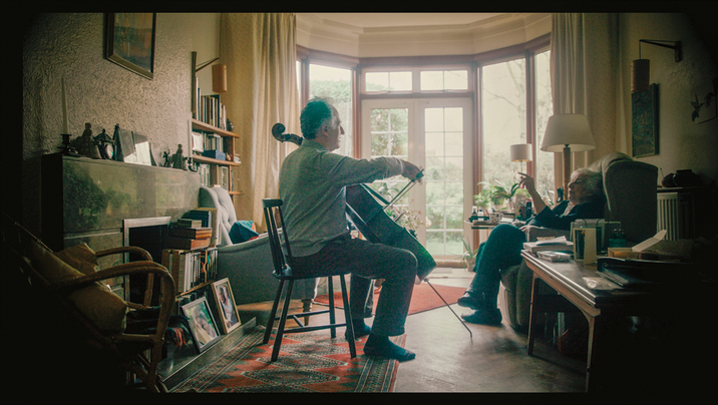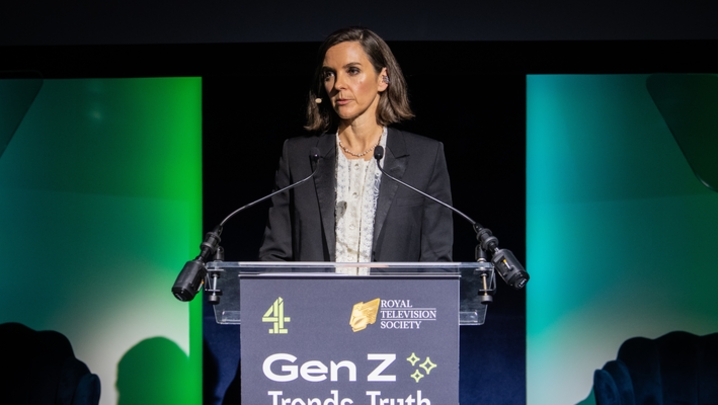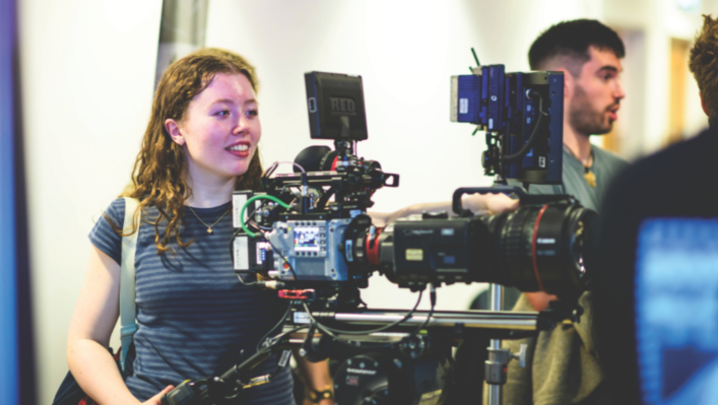As W1A prepares for season 3, the show’s creator needs to tread carefully, hears Matthew Bell
W1A has enjoyed two successful series gently mocking its BBC paymaster and delighting audiences. But with government pressure on the corporation mounting, Writer/Director John Morton faces some tricky decisions as he prepares a third series.
“It will be harder to pretend that I don’t hope the BBC survives,” Morton told a packed RTS London Centre event, “W1A: the story behind the series”, at the end of January.
Morton explained that he had tried to steer a path between making the programme “too cosy, so that it reads as a gloriously expensive vanity-publishing project on behalf of the BBC” and “making something that hands the detractors of the BBC yet another stick to beat it with”.
For the first two series, Morton had avoided becoming polemical. Now, he admitted, “I can’t avoid it. I don’t know quite how but, in some way that I can’t articulate yet, in the fictional world that is W1A, Hugh Bonneville’s character, Ian Fletcher, and the people around him will somehow, by hard work, accident or fluke, contrive to save the BBC.”
Morton, a former teacher, enjoyed his first TV success with spoof BBC Two documentary People Like Us, starring Chris Langham, which originally ran on BBC Radio 4.
He was joined at the London event by W1A Executive Producer Jon Plowman. The comedy veteran has had a hand in numerous TV comedy classics, including Absolutely Fabulous, The Office and The Thick of It.
W1A’s forerunner, London Olympics mockumentary Twenty Twelve, was initially poorly received by the corporation, revealed Morton.
“Twenty Twelve had a bit of a bumpy start – it wasn’t always liked very much in the BBC,” he said. “When it went out and did OK the music changed from ‘We don’t think this is very good’ to ‘Can we have more of these wonderful characters?’”
That presented the writer with a problem. His comedy about organising the 2012 London Olympics, which ran for two series, on BBC Four in 2011 and BBC Two in 2012, had “obsolescence built into it”.
Once the Olympics were over, so was the programme.
Morton’s solution was to transfer Twenty Twelve’s key protagonists to the BBC. Bonneville’s character swapped one meaningless title, Head of Deliverance at the Olympic Deliverance Commission, to another, Head of Values at BBC headquarters – postcode, the eponymous W1A. Jessica Hynes’s appalling PR guru, Siobhan Sharpe, brought the team from her gruesome agency, Perfect Curve. And narrator David Tennant came too.
"I didn’t want people to play the game of ‘Who is that supposed to be?’"
New characters included clueless entertainment producer David Wilkes (played by Rufus Jones), fearful executive Anna Rampton (Sarah Parish) and inept intern Will Humphries (Hugh Skinner).
Morton and Plowman had discussed setting the series in other public bodies, such as the NHS and the army, but the only one Morton “sparked at”, said Plowman, was the BBC.
“The thing that the BBC shares with the Olympics is that we all pay for it and feel we have investment in it,” argued Morton. “What Hugh does brilliantly is to give us the sense of a man who is trying to do the right thing all the time, which is what you get in a public-service organisation.”
Nevertheless, he added: “If all the characters were paragons of virtue, making the right decisions all the time, there would be no comedy.”
“The spirit behind the show is that the BBC is a good thing,” added Plowman. “The things to be laughed at are the small things that human beings do, not the big things that the institution tries to do.”
W1A rails at the idiocies of modern office life, as well as satirising the BBC. “I didn’t want it to be an inward-looking, exclusively BBC story,” said Morton. “The aspiration was that enough of this nonsense happens in big corporations.”
Perhaps surprisingly, in view of the stupidity of the job titles (Director of Better), the programme ideas (“Britain’s Tastiest Village”) and the staff (too many to mention), the BBC adopted a laissez-faire attitude to W1A.
“You would think that if there was ever a project that would get some kind of interference from above, this would be it. But I have not had a single note about anything from anyone,” revealed Morton.
“There’s a very BBC way in which it’s been handled,” said Plowman. “Had it been made for a big American network, the network, I suspect, would have been all over it like a rash.
“No one told us to do or not to do anything – it was handled very well by the people who didn’t contact us.”
‘W1A: the story behind the series’ was an RTS London event held at ITV Studios in central London on 27 January. David Poyser chaired and produced the event.
Mockumentary masterclass
Casting
Writer/Director John Morton:
‘It’s impossible to believe now but the roles were unattached to any real actors. The only voice I could hear was Hugh [Bonneville’s]. We had a brilliant Casting Director, Rachel Freck, and Producer, Paul Schlesinger, and as a team they were formidable.… [Casting] is an exhausting and exhaustive process.’
Acting
Writer/Director John Morton:
‘I can’t begin to say how hard the actors work to make it look easy. If you look at a page of script, there are very few lines that are complete –they run into each other.’
Executive Producer Jon Plowman :
‘None of it is improvised – it’s entirely written by John.’
Research
Writer/Director John Morton:
‘It is all made up. None of the job titles are accurate. I didn’t want to invite people to play the game of “Who is that supposed to be?”… I was trying to create a parallel universe that is very like the BBC.’
Executive Producer Jon Plowman:
‘We had a series of lunches with the relatively great and the relatively good, from which John emerged saying, “I think that’s enough.” People were telling you their best stories, which are great to have, but not really of any use.’
Set design
Morton:
‘The designer gave us a set that is like the BBC, but turned up a few notches. The Frankie Howerd and Tommy Cooper meeting rooms don’t exist but the colour and feel of them [gives] the show the flavour of the BBC.’
Filming
Plowman:
‘Getting permission to film in Television Centre required documents to be signed in at least triplicate by a lot of people who, as far as I knew, had never made a programme. We went to see a man at New Broadcasting House who immediately said, “Yes, we want this to be a working building.”’
Narration
Morton:
‘The last thing we do is to get David Tennant to record the narration. It’s a cheat, really, because, in editing, if we have to flip something around or cut something out, I can rewrite the voice-over and David can say something else. It’s a very useful piece of architecture for stitching things together.’
Real people
Morton:
‘Clare Balding and Carol Vorderman were written in and I hoped they would do it. In general, I’m not really a big fan [of casting real people] because I don’t get particularly excited about people playing themselves; also, most people are very poor at playing themselves.
‘We had a scene with Alan Yentob and Salman Rushdie arm wrestling and I’d just written, “Ian Fletcher opens the door and sees Alan Yentob and someone he can’t believe he’s just seen doing something”. For a while, it was going to be Kylie Minogue and then Amir Khan.…
‘On the day of filming, Salman Rushdie and Alan Yentob were doing a photo shoot and [we were offered] Rushdie.… What were they going to do [in W1A]? All I could think of was that they were arm wrestling.’







